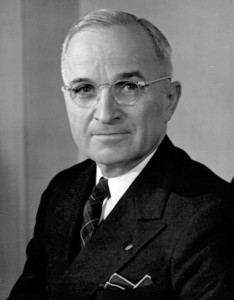 In light of the recent debt ceiling showdown within the federal government, the continuing gridlock in Congress, and the increasing popularity of the Occupy Wall Street movement, it is important to remember that America has fought this same type of ideological battle many times before. Perhaps the most relevant historical examples for our own situation are the administrations of Franklin Roosevelt and Harry Truman. In the Arthur B. Church KMBC Collection, there are many speeches available for listening from this period. I’d like to focus on one in particular, a national address given by President Truman on 13 July 1949. It’s startling to hear the connections to our own time. Here is an excerpt from the speech. [audio:http://info.umkc.edu/specialcollections/wp-content/uploads/2011/10/2011-10-24_TrumanOnEconomy_Church_truman.mp3|titles=Truman on the Economy]
In light of the recent debt ceiling showdown within the federal government, the continuing gridlock in Congress, and the increasing popularity of the Occupy Wall Street movement, it is important to remember that America has fought this same type of ideological battle many times before. Perhaps the most relevant historical examples for our own situation are the administrations of Franklin Roosevelt and Harry Truman. In the Arthur B. Church KMBC Collection, there are many speeches available for listening from this period. I’d like to focus on one in particular, a national address given by President Truman on 13 July 1949. It’s startling to hear the connections to our own time. Here is an excerpt from the speech. [audio:http://info.umkc.edu/specialcollections/wp-content/uploads/2011/10/2011-10-24_TrumanOnEconomy_Church_truman.mp3|titles=Truman on the Economy]
Consider the scene in July 1949: still fresh from World War II, less than one year from our foray into Korea, right in the middle of the Alger Hiss saga. Unemployment is high due to the influx of veterans and young people newly arrived to the American workforce, and the growth of the economy has slowed down significantly. In the midst of this, Truman is fighting a battle over the budget, a battle that extends back to the 80th Congress, called the “Do-Nothings” in a completely non-affectionate way by the President. At issue are government spending and the national debt. What to do about it is an answer that, clearly, we still haven’t figured out.
Truman, perhaps not the most gifted orator (especially when compared to his predecessor), is nonetheless appealing because a) he’s folksy and b) he sounds furious. He is the last president without a college education and that simple fact adds to his appeal, in this writer-with-crippling-student-loans’ opinion.
The speech itself is compelling because it may as well have been given last week. Confronting what he considers backwards logic from people with “selfish interests,” Truman argues that the worst things to try and cure a slow economy are cuts in spending or cuts in taxes. Instead, the government should increase revenues and spending in an effort to stimulate growth and reduce unemployment, and focus on deficits down the line. For a guy with no college education, he sounds suspiciously like numerous economists today.
It is interesting to note here, as with many historical documents, the ideological shift of the country’s two primary political parties over the years. Truman was a Democrat in many ways that are familiar to us today: expansion of the New Deal programs, increased regulation, etc. But it is fascinating to hear him argue with great vehemence for substantial military spending, a position that sounds much more like the Republican Party of the post-9/11 universe. Did he know that there would be an upcoming engagement across the world at that time? It’s hard not to assume so; there were certainly plenty of skirmishes at the 38th Parallel in Korea at the end of Chinese Civil War and through the remainder of 1949.
Most people are familiar with George Santayana’s quote “Those who cannot remember the past are condemned to fulfill it.” Perhaps as many as are familiar with Carlos Santana’s quote “I don’t actually speak <insert guitar riff here>.” When it comes to matters economic, it is hard to tell if our current lawmakers remember Santayana’s exhortation about the past, or Santana’s smash hit “Smooth” featuring the dulcid tones of Matchbox 20’s Rob Thomas for that matter! It is somehow both comforting and disconcerting to know that we’ve struggled with these same issues, frankly, since the birth of our nation: comforting because America may have reached its zenith in the decades after this speech; disconcerting because we’ve come full circle–and then some–and still don’t know what to do.
Erik Klackner, guest contributor
To access the complete recording, you may request part 1 and part 2 from the Marr Sound Archives.
